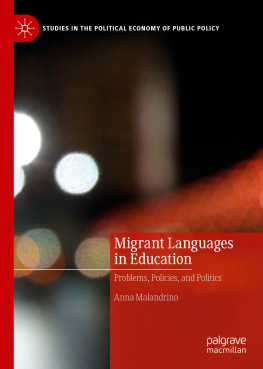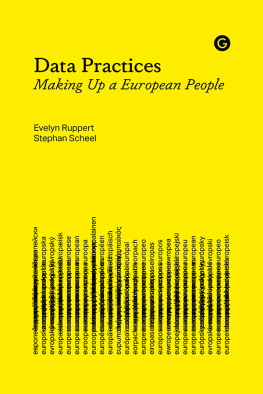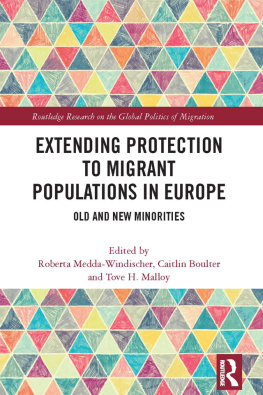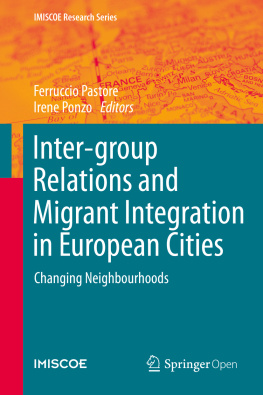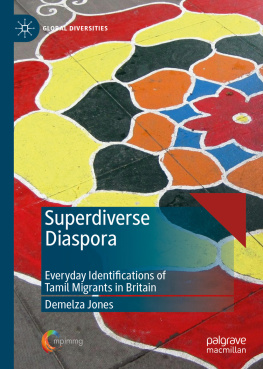This is a major methodological contribution to cross-national comparative social policy which addresses the relationship between universal services and complexly diverse needs across four European countries. It provides a highly original and sophisticated multiscalar analysis of the social relations of health care drawn from the experiences of service-users and practitioners in neighbourhoods characterised by their social, racial, ethnic, migrant and citizenship diversity. Through a critical engagement with the concepts of superdiversity and bricolage, the authors show how users and providers piece together ways of meeting health needs in different national and transnational contexts which constrain and occasionally enable them. Vital reading for students and researchers.
Fiona Williams, Emeritus Professor of Social Policy at the University of Leeds, Honorary Professor at the Social Policy Research Unit, University of New South Wales, Australia, and Research Affiliate at COMPAS, University of Oxford
Until now, superdiversity has been used as a concept for re-conceptualizing societies, developing theories of complexity, and re-tooling research methods. This book brings a much-needed approach in terms of superdiversitys meanings for public service provision and delivery. Based on solid empirical findings, it is a very welcome and timely contribution!
Steven Vertovec , Max Planck Institute for the Study of Religious and Ethnic Diversity
Exploring Welfare Bricolage in Europes Superdiverse Neighbourhoods
Migration-driven diversity means European cities are becoming increasingly superdiverse. Some European neighbourhoods have become places where newcomers arrive from across the world, speaking many different languages, from a range of socio-economic backgrounds and with diverse religious beliefs and practices, while living alongside long-established migrant and white European populations. This book focuses on what this increasing population diversity means for how people and local health and welfare service providers seek to address everyday health concerns from minor and chronic conditions to acute and urgent problems.
Using an innovative mixed-method approach crossing multiple disciplines and drawing together rich qualitative and robust quantitative data, this book offers unique insight into the complex and intricate actions, which often vary over space and time, implemented by both residents and care providers from eight superdiverse localities in four European countries, each with different health and welfare traditions. The book introduces the concept of welfare bricolage, using it as a mechanism to explore the structures and rationales underpinning need and actions, and how resources are connected across welfare regimes and borders and within locales. The book illustrates how, in the face of increasingly marketised, cash-strapped, restrictive and institutionally racist welfare states and healthcare regimes, individuals and service providers strive to address need.
By focusing on welfare regimes, migration histories, everyday actions and resources within neighbourhoods, Exploring Welfare Bricolage in Europes Superdiverse Neighbourhoods offers a unique insight into what people and providers actually do when faced with health concerns. The book highlights the role of structure and agency and moves beyond conventional approaches that focus on specific groups or sectors to research health and welfare by looking at whole populations and entire welfare ecosystems. The books theoretical, methodological and empirical contributions will be of use to scholars, practitioners and policymakers interested in welfare, healthcare, diversity and migration.
Jenny Phillimore is Professor of Migration and Superdiversity at the University of Birmingham, UK.
Hannah Bradby has been Professor at the Sociology Department, Uppsala University, Sweden since 2013, having previously held a senior lectureship at the University of Warwick, UK.
Tilman Brand is Head of the research group Social Epidemiology at the Leibniz Institute for Prevention Research and Epidemiology since 2012.
Beatriz Padilla teaches in the Department of Sociology and is Interim Director of the Institute for the Study of Latin American and the Caribbean (ISLAC) at the University of South Florida, in the United States.
Simon Pemberton is Professor of Human Geography at Keele University, UK.
Routledge Advances in Sociology
303 COVID-19
Volume I: Global Pandemic, Societal Responses, Ideological Solutions
Edited by J. Michael Ryan
304 COVID-19
Volume II: Social Consequences and Cultural Adaptations
Edited by J. Michael Ryan
305 Prevent Strategy
Helping the Vulnerable Being Drawn Towards Terrorism or Another Layer of State Surveillance?
Edited by David Lowe and Robin Bennett
306 Regime Change in Turkey
Neoliberal Authoritarianism, Islamism and Hegemony
Edited by Errol Babacan, Melehat Kutun, Ezgi Pnar and Zafer Ylmaz
307 The Politics of Europeanisation
Work and Family Life Reconciliation Policy
Nazli Kazanoglu
308 Internet Dating
Intimacy and Social Change
Chris Beasley and Mary Holmes
309 Transcending Modernity with Relational Thinking
Pierpaolo Donati
310 Exploring Welfare Bricolage in Europes Superdiverse Neighbourhoods
Jenny Phillimore, Hannah Bradby, Tilman Brand, Beatriz Padilla and Simon Pemberton
311 The Home in the Digital Age
Antonio Argandoa, Joy Malala and Richard C. Peatfield
For more information about this series, please visit: https://www.routledge.com/Routledge-Advances-in-Sociology/book-series/SE0511
Exploring Welfare Bricolage in Europes Superdiverse Neighbourhoods
Jenny Phillimore, Hannah Bradby, Tilman Brand, Beatriz Padilla and Simon Pemberton
First published 2021
by Routledge
2 Park Square, Milton Park, Abingdon, Oxon OX14 4RN
and by Routledge
605 Third Avenue, New York, NY 10158
Routledge is an imprint of the Taylor & Francis Group, an informa business
2021 Jenny Phillimore, Hannah Bradby, Tilman Brand, Beatriz Padilla and Simon Pemberton
The right of Jenny Phillimore, Hannah Bradby, Tilman Brand, Beatriz Padilla and Simon Pemberton to be identified as authors of this work has been asserted by them in accordance with sections 77 and 78 of the Copyright, Designs and Patents Act 1988.
All rights reserved. No part of this book may be reprinted or reproduced or utilised in any form or by any electronic, mechanical, or other means, now known or hereafter invented, including photocopying and recording, or in any information storage or retrieval system, without permission in writing from the publishers.
Trademark notice : Product or corporate names may be trademarks or registered trademarks, and are used only for identification and explanation without intent to infringe.
British Library Cataloguing-in-Publication Data
A catalogue record for this book is available from the British Library
Library of Congress Cataloging-in-Publication Data
Names: Phillimore, Jenny, author.
Title: Exploring welfare bricolage in Europe's superdiverse neighbourhoods / Jenny Phillimore [and four others].
Description: Abingdon, Oxon ; New York, NY : Routledge, 2021. | Series: Routledge advances in sociology | Includes bibliographical references and index.


